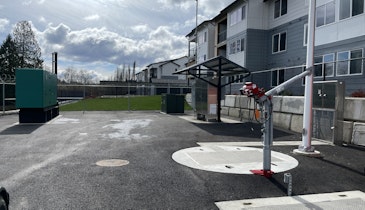Interested in Excavating?
Get Excavating articles, news and videos right in your inbox! Sign up now.
Excavating + Get AlertsThe typical (perhaps stereotypical) image of the onsite installer is a guy with a backhoe. More than ever these days we run across installers who do the business without the big-boy toys.
One of those is this month’s featured contractor, Residential Sewage Treatment Co. of Grandview, Mo. Unlike a design firm, which essentially does the site evaluation, selects the system and configuration and draws the plans, Residential stays involved throughout the installation, although the company itself does no excavation.
The firm relies on installers to excavate for the tanks and drainfield. Then during construction, company personnel deliver treatment system components, install aerator assemblies, and in some cases also install pumps, control systems and panels. Each project is a close collaboration with one of several local installers with whom Residential has relationships.
Personal preference
There are variations on this theme in the industry. Some installers own only one or a few basic machines that they use on nearly every job, then either rent other equipment as needed or hire local contractors.
It’s an approach that makes plenty of sense. Is it “better” to operate this way than to own most or all necessary equipment? That depends. In part it’s about personal preference. One clear advantage to owning equipment is the ability to sell and earn a profit on the machine work instead of handing that revenue off to someone else.
And, for some installers, doing the digging is an enjoyable and rewarding part of the profession. If you doubt that, visit the annual Roe-D-Hoe competition at the Pumper & Cleaner Environmental Expo. You’ll see some true artists at work on the machines and some very engaged spectators.
One challenge of owning equipment is keeping it busy. Few can afford to have a costly asset sitting idle much of the time. That’s why many installers maximize the use of their machinery by doing other kinds of excavation, which may include site work on the lots where they install systems, and completely unrelated projects.
A workable model
Then there are professionals to whom it’s much more about systems than digging. They choose to sell their expertise in onsite and let others deal with the machines.
What are the advantages to this approach? Well, they can focus on treatment systems without having to scare up work digging basements or installing culverts. They don’t have the headaches of maintaining equipment, storing it over the winter, and hauling it back out in spring.
They don’t need heavy trucks or trailers to move the machines around — a pickup truck or even just a car will do. Breakdowns and emergency repairs are someone else’s problem (except to the extent that they affect progress on jobs).
Jobbing out machine work by definition means less revenue, but it also means fewer headaches and less financial risk. And if the work you really enjoy is designing the treatment scheme and making sure the equipment is installed right, this is the way to go.
What’s your preference?
Clearly neither approach to the business is “right” or “wrong” other than for the parties deciding how to operate. But as a general trend, where are things heading in the industry? Are more professionals leaning toward right-sizing the equipment fleet — keeping the basics and renting the rest? Or is owning equipment just as integral to the business as it has been by tradition?
Let’s start a discussion. How do you approach equipment? Do you prefer to own and operate all or most of what you need? Or do you limit your fleet and focus on the art and science of systems? And in either case, why?
Send a note with your perspectives to editor@onsiteinstaller.com. I promise to respond, and we’ll share the comments we receive in a future issue.





